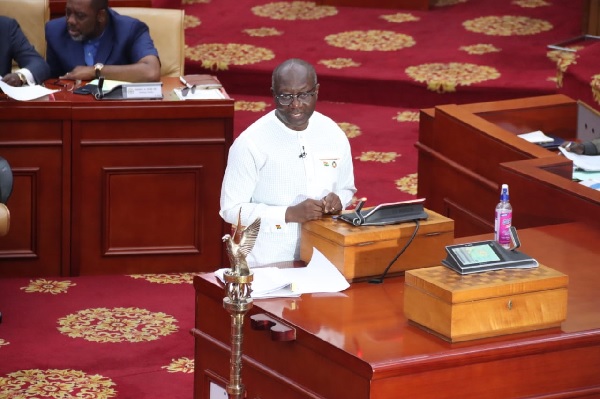
Economy to hit GH¢1 trillion next year: Economist says it is insignificant
Ghana's economy is projected to be valued over GH¢1 trillion in 2024 from the GH¢219.5 billion in 2016, the Minister of Finance, Ken Ofori-Atta has said.
It would be the first time in the country’s economic history to cross the GH¢1 trillion Gross Domestic Product (GDP) mark.
Mr Ofori-Atta who announced this when he presented the 2024 Budget statement to parliament yesterday (Wednesday), said that achievement was possible.
“A key lesson from this leap since 2017 is for us to eschew unfounded pessimism.
“We have shown that it is possible. We should be collectively proud of ourselves and the can-do-spirit of our people. We have proven that a lot more is possible, if we stay the course and believe in a future of immense possibilities,” he said.
The 2024 Budget, nicknamed “nkunim” (victory) spelt out the government’s interventions for social protection, job creation and tax reduction measures.
Mr Ofori-Atta said despite a tough economic situation since 2021, the economy was now showing signs of recovery and improvement.
“I want to stress at this juncture that Ghana is back on track,” he said.
Atmosphere
Mr Ofori-Atta, wearing his signature white kaftan, slowly delivered the government's fiscal policy, revenue measures, and expenditure priorities for the next year, detailing how the government intended to rake in more revenue domestically without further burdening the taxpayer and measures to address the country’s debt position.
However, the atmosphere in the house was tense as some members of the opposition booed and heckled him, while supporters of the government cheered occasionally in response.
Sitting in the public gallery were some national executives of the ruling New Patriotic Party (NPP), including its Chairman, Stephen Ntim. The Chief of Staff of the Office of the President, Akosua Frema Opare Osei, and Senior Presidential Advisor, Yaw Osafo-Maafo were also present.
Plan to trillion
Mr Ofori-Atta said with such a milestone ahead, the government would protect at all cost, the foundation for sustained economic expansion.
“A foundation that has been achieved through the sweat and patience of the Ghanaian people.
“We pledge to protect this for all our people and especially for private sector growth,” the minister said.
He said the government would ensure that the enabling factors were in place and accessible to all, including reliable energy supply, stable Cedi, lower inflation and lower interest rate regimes, as well as access to private sector credit, infrastructure provision, food security and national security.
The plan also includes inter-continental market linkages through increasing active platforms such as the African Continental Free Trade Area (AfCFTA).
Mr Ofori-Atta said the government would continue to collaborate with all stakeholders as it stayed the course for transformational development of the country.
“We engaged with and obtained valuable inputs from key stakeholders, including investors, traders, academia, organised labour, civil society organisations, bankers, development partners, faith-based organisations, and a cross-section of the leadership and other honourable Members of Parliament,” he said.
The Finance Minister also highlighted the positive economic indicators that showed the country was on the path to sustainable growth.
He pointed out that inflation had declined from 54.1 per cent in December 2022 to 35.2 per cent in October 2023, and the economy had exceeded its projected growth rate, clocking an average of 3.2 per cent growth in the first two quarters of the year. Additionally, the depreciation of the currency had been modest compared to previous years, reflecting improved confidence and revenues.
The Finance Minister also emphasised other signs of economic recovery, such as companies hiring workers, positive assessments from international credit rating agencies, and the banking industry reporting a profit-after-tax growth of 43.8 per cent.
Insignificant
Reacting to the government’s projection of the size of the economy, an economist from the University of Cape Coast, Professor John Gatsi, said expansion in the size of the economy was insignificant because it didn’t translate into real growth in the critical sectors that drove development.
He said the expansion in the size of the economy or GDP was always a given, as it kept expanding year in year out, and added that such leaps in the size of the economy had been recorded over the years.
“It’s not about size but how you have been able to manage the economy to provide jobs,” he said.
He added that the size of the economy has been growing over the years. For instance, he said the economy was worth $28.68 billion in 2008 and rose to $56.17 billion in 2016,. showing a consistent expansion over the period.
“What is expected of economic growth is to establish the cumulative jobs and opportunities it create,” he said.
He said despite enormous investments into the government’s one district, one factory initiative, the industry sector was growing at 0.9 per cent last year and recorded negative growth in the first quarter of this year.
“We should rather be worried that we are not managing well the sectors that would drive growth and our industry sector is recording negative growth figures,” he added.